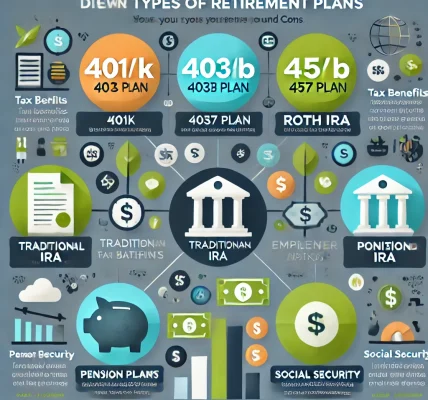Retirement planning is a crucial aspect of financial security, but it becomes even more complex for expatriates. Expats face unique challenges, such as different tax laws, fluctuating exchange rates, and varying costs of living across countries. However, with the right strategy, expats can ensure a comfortable and financially secure retirement. This guide will provide an in-depth look at the key factors expats need to consider when planning for retirement.
Understanding the Challenges of Expat Retirement Planning
1. Tax Implications
Taxation is one of the most critical considerations for expat retirees. Many countries have specific tax laws for foreign income, and some may even tax worldwide income. It is essential to understand:
- Double Taxation Agreements (DTAs): Some countries have DTAs in place to prevent expats from being taxed twice on the same income.
- Tax Residency Rules: Depending on your length of stay and financial ties, you may be considered a tax resident in multiple countries.
- Pension Taxation: Some pensions are taxed differently depending on where you retire.
2. Access to Pension Funds
Expats need to ensure they can access their retirement savings efficiently. Some key considerations include:
- Transferring Pension Funds: Some retirement plans allow for the transfer of funds to an international pension scheme, such as a Qualifying Recognised Overseas Pension Scheme (QROPS).
- Local Pension Plans: Some countries offer retirement savings plans that may be beneficial for expats.
- Social Security Benefits: Expats may be eligible for social security benefits from their home country or host country based on contribution history.
3. Healthcare Considerations
Healthcare costs can significantly impact retirement savings. Expats should consider:
- Health Insurance: International health insurance policies can help cover medical expenses in different countries.
- Local Healthcare Systems: Some countries offer high-quality, affordable healthcare, while others require private insurance.
- Long-term Care Costs: Plan for potential long-term care expenses, especially in countries with high medical costs.
4. Cost of Living Variations
The cost of living can differ significantly from one country to another. Consider:
- Housing Expenses: Renting vs. buying property in a foreign country.
- Daily Living Costs: Groceries, transportation, and utilities.
- Currency Fluctuations: Exchange rate risks can impact fixed-income retirees.
Best Retirement Strategies for Expats
1. Diversify Retirement Savings
Expats should maintain a diversified portfolio that includes:
- International Investments: Stocks, bonds, and real estate in different countries.
- Multi-currency Accounts: Holding savings in different currencies to hedge against exchange rate risks.
- Offshore Retirement Accounts: Some countries offer tax-efficient retirement savings accounts for expats.
2. Choose a Tax-Friendly Retirement Destination
Many countries offer tax incentives for foreign retirees, such as:
- Portugal: The Non-Habitual Resident (NHR) program offers tax exemptions on foreign income.
- Malaysia: The Malaysia My Second Home (MM2H) program provides residency benefits.
- Costa Rica: A popular expat destination with low-cost healthcare and retirement-friendly visa policies.
3. Consider Real Estate Investments
Buying property in a retirement destination can provide stability and rental income. Key factors to consider:
- Property Ownership Laws: Some countries restrict foreign property ownership.
- Rental Market: A property in a high-demand area can generate passive income.
- Tax on Property Income: Understand the tax implications of owning and renting out property.
4. Plan for Currency Risks
Exchange rate fluctuations can erode retirement savings. To mitigate risks:
- Use Multi-Currency Bank Accounts: This allows for flexibility in managing funds.
- Invest in Local Currency Assets: Holding assets in the currency of your retirement country can reduce risks.
- Consider Hedging Strategies: Financial instruments like forex hedging can protect against currency volatility.
5. Review Estate Planning and Legal Considerations
Expats must have a solid estate plan to ensure their assets are properly distributed. Consider:
- International Wills: Some countries require a separate will for foreign assets.
- Inheritance Tax Laws: Some jurisdictions impose high taxes on inherited wealth.
- Power of Attorney: Designating a trusted person to manage financial affairs in case of incapacity.
Steps to Take Now for a Secure Expat Retirement
1. Assess Your Financial Situation
- Determine your current net worth.
- Calculate expected retirement expenses.
- Identify potential sources of income.
2. Research Retirement Destinations
- Compare cost of living, healthcare, and tax policies.
- Visit potential retirement locations before making a decision.
- Consider cultural and language barriers.
3. Consult a Financial Advisor
A financial expert specializing in expat retirement can help you navigate complex tax and investment strategies.
4. Regularly Review Your Plan
- Keep track of changes in tax laws and financial regulations.
- Adjust your investment portfolio as needed.
- Stay informed about economic trends affecting retirement savings.
Conclusion
Retirement planning for expats requires careful consideration of tax laws, pension access, healthcare, and cost of living. By diversifying investments, choosing a tax-friendly location, and planning for currency fluctuations, expats can secure a comfortable and worry-free retirement. Start planning today to enjoy financial independence and a fulfilling retirement abroad.
Need expert guidance? Consult a financial advisor to create a tailored expat retirement plan!




